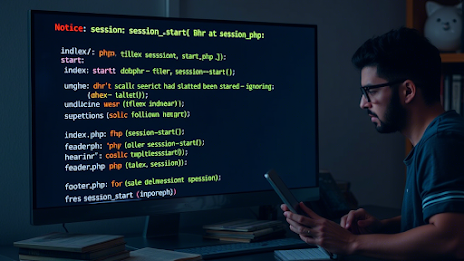Notice: session_start(): A session had already been started
The error Notice: session_start(): A session had already been started - ignoring occurs because session_start() is being called multiple times in your application. In PHP, session_start() should only be called once per request, as subsequent calls will trigger this notice. This is likely happening because the session_start() function is being invoked in the index.php file and possibly in one of the included files (../includes/db.php, ../includes/functions.php, ../includes/header.php, or ../includes/footer.php).
Here’s how you can diagnose and fix the issue:
Steps to Resolve the Issue
- Check for Multiple session_start() Calls
- The error indicates that session_start() is being called more than once. Since you have session_start() on line 11 of index.php, check the included files (db.php, functions.php, header.php, or footer.php) for additional calls to session_start().
- Look for session_start() in:
- ../includes/db.php
- ../includes/functions.php
- ../includes/header.php
- ../includes/footer.php
- Prevent Multiple session_start() Calls
-
To avoid this issue, ensure that session_start() is called only once at the beginning of the request. You can use the session_status() function to check if a session is already active before calling session_start(). Modify the code in index.php (line 11) as follows:
// Start session only if it hasn't been started if (session_status() === PHP_SESSION_NONE) { session_start(); }
This checks if a session is already active (PHP_SESSION_ACTIVE) and only starts a new session if none exists (PHP_SESSION_NONE).
- Move session_start() to a Common Include File
If multiple files in your application need session access, it’s better to move the session_start() call to a single common file that is included early in the request lifecycle, such as ../includes/functions.php or ../includes/header.php. For example, in functions.php:
// In ../includes/functions.php if (session_status() === PHP_SESSION_NONE) { session_start(); }
Then, remove the session_start() call from index.php and ensure that functions.php is included before any session-related code.
- Best Practices
Always call session_start() as early as possible in your script, before any output is sent to the browser, to avoid issues with headers already sent
Consider centralizing session management in a single configuration file to avoid accidental duplicate calls.
In production, disable display_errors to prevent notices from being exposed to users:




Post a Comment
0Comments